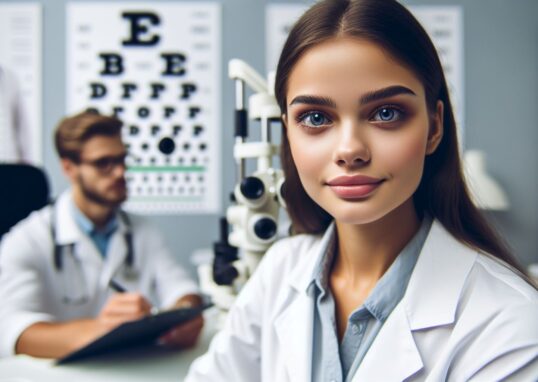
Macular degeneration is a medical condition that affects the central part of the retina, known as the macula. This area of the eye is crucial for sharp, straight-ahead vision, which is essential for activities like reading, driving, and recognizing faces. The condition is most commonly associated with aging and is, therefore, often referred to as age-related macular degeneration (AMD). It can lead to significant visual impairment and is one of the leading causes of vision loss in older adults.
When it comes to the treatment and management of macular degeneration, specialized doctors known as retina specialists are the primary caregivers. These medical professionals are ophthalmologists who have undergone additional training to diagnose and treat diseases of the retina and vitreous, which is the gel-like substance inside the eye.
What Does a Retina Specialist Do?
A retina specialist plays a crucial role in diagnosing and managing conditions that affect the retina, which is the light-sensitive tissue at the back of the eye. Here are some key aspects of their role:
- Diagnosis and Assessment:
- Retina specialists are highly trained ophthalmologists who focus specifically on retinal diseases. They use specialized equipment to examine the retina and identify any abnormalities.
- Age-related macular degeneration (AMD) is one of the conditions they commonly encounter. AMD affects the central part of the retina (the macula) and can lead to vision loss.
- During a comprehensive eye exam, the retina specialist dilates the patient’s pupils to obtain a better view of the retina. This allows them to assess the health of the blood vessels, optic nerve, and other retinal structures.
- Treatment Options:
- Once a diagnosis is made, the retina specialist discusses treatment options with the patient. The goal is to preserve or improve vision.
- Treatment approaches vary depending on the specific condition. For AMD, options may include:
- Anti-VEGF Injections: These medications help reduce abnormal blood vessel growth and leakage in the retina.
- Laser Therapy: Laser treatment can be used to seal leaking blood vessels or target abnormal tissue.
- Photodynamic Therapy: A combination of light-sensitive drugs and laser treatment to treat certain types of AMD.
- Nutritional Supplements: Some patients benefit from specific vitamins and minerals to support retinal health.
- Monitoring: Regular follow-up visits are essential to track disease progression and adjust treatment as needed.
- Amsler Grid:
- The Amsler grid is a simple tool used to detect changes in central vision. It consists of a grid of intersecting lines with a central dot.
- Patients with retinal conditions, including AMD, are asked to look at the grid. If they notice any distortion, missing areas, or wavy lines, it could indicate retinal abnormalities.
- The Amsler grid helps patients self-monitor their vision between appointments.
In summary, retina specialists are skilled in diagnosing and managing retinal diseases, including AMD. Their expertise ensures timely intervention and personalized treatment plans to optimize visual outcomes. I
Treatment and Management
For wet AMD, retina specialists often use anti-VEGF injections. These medications help to reduce the growth of abnormal blood vessels and slow the leakage that damages the macula. For dry AMD, especially in advanced stages, specialists might recommend a specific formula of vitamins and minerals known as the AREDS-2 supplement to help slow the progression of the condition.
In addition to medical treatment, retina specialists may work with low vision specialists to help patients adapt to any vision loss they may experience. Low vision specialists can recommend devices and aids to help individuals with macular degeneration maintain their independence and continue their daily activities.
Finding the Right Doctor
Patients with macular degeneration or those experiencing symptoms that suggest this condition should seek care from a retina specialist. Often, an optometrist or general ophthalmologist will refer patients to a retina specialist if they detect signs of AMD. However, patients can also request a referral if they believe they are experiencing symptoms of macular degeneration.
Institutions like the Mayo Clinic are renowned for their expertise in treating retinal diseases, including AMD. They have a team of specialists who are not only involved in patient care but also in research to improve the understanding and treatment of macular degeneration. The Mayo Clinic and other similar institutions often work with various insurance companies and may not require a physician referral, though it’s always best to check with your insurance provider.
Conclusion
Retina specialists play a vital role in the diagnosis, treatment, and management of macular degeneration. They use their expertise to help preserve vision and improve the quality of life for those affected by this condition. With advancements in medical research and treatment options, there is hope for patients with AMD to maintain their vision and independence for as long as possible. If you or someone you know is experiencing symptoms of macular degeneration, it is crucial to seek the care of a retina specialist to explore the available treatment options. Remember, early detection and treatment are key to managing this eye condition effectively.
Here’s a list of additional resources:
- Mayo Clinic: Care for Dry Macular Degeneration
- Mayo Clinic offers experienced ophthalmologists specialized in retinal diseases for the treatment of dry macular degeneration.
- American Macular Degeneration Foundation: What Kind of Doctor Do I Need to See
- The foundation advises that optometrists or ophthalmologists will refer patients to a retina specialist for macular degeneration.
- Mayo Clinic: Doctors and Departments
- Provides a list of physicians at Mayo Clinic who specialize in macular degeneration, including Dr. Sophie J. Bakri, Dr. Raymond Iezzi, and Dr. Michael W. Stewart.
- The American Society of Retina Specialists: Age-related Macular Degeneration
- Information on how age-related macular degeneration (AMD) can be diagnosed by an eye doctor or retina specialist.
- Pacific Eye Institute: What Type of Eye Doctor Treats Macular Degeneration?
- Discusses the types of eye doctors that treat macular degeneration, including retina specialists and low vision specialists.





